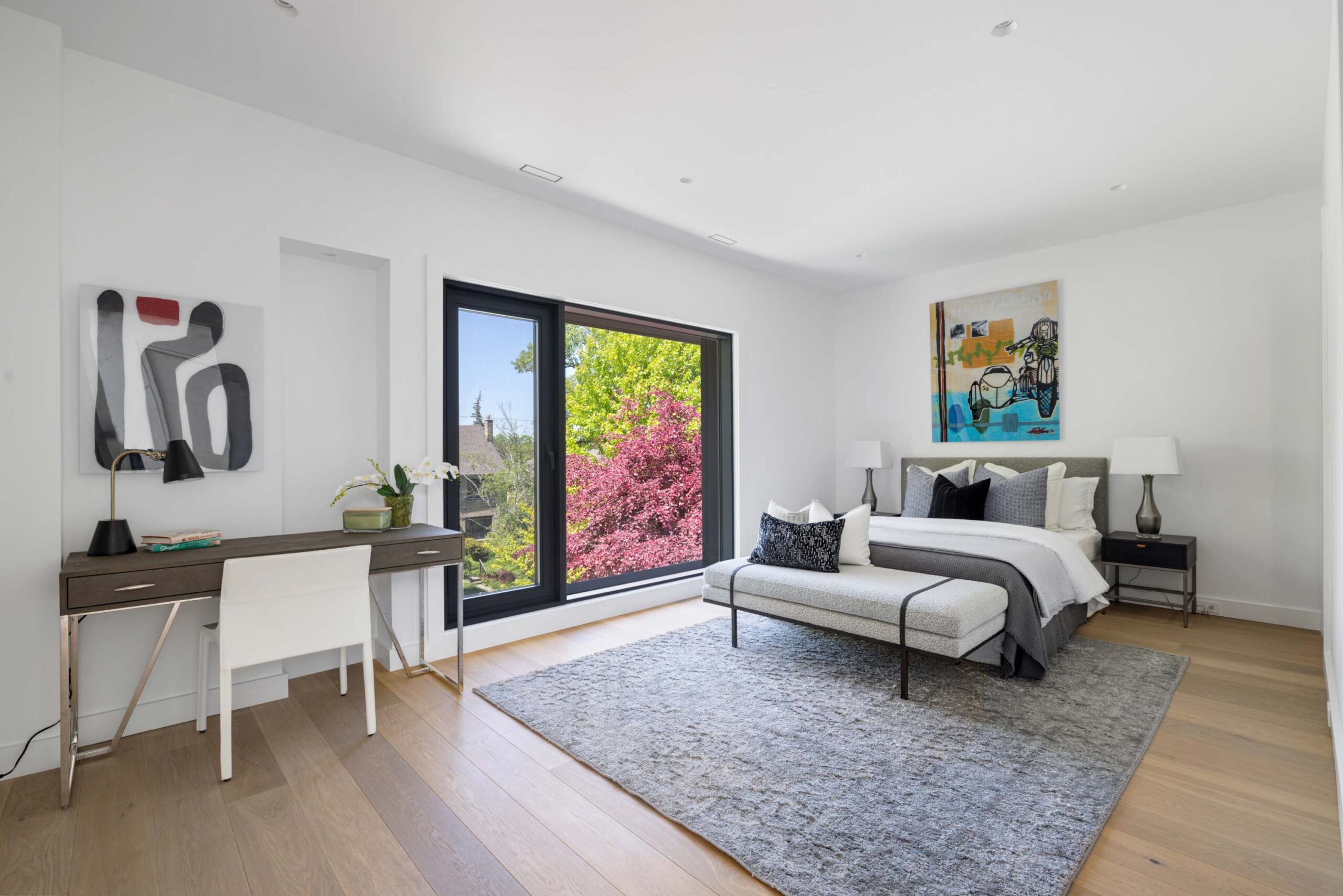November 11th, 2021 | Real Estate
Is It Better To Buy First Or Sell First?

If you’re a homeowner and you’re looking to move, you’ve most likely spent some time considering whether or not it’s better for you to sell your current home before buying a new one, or buy your next home before selling your current one.
While this sounds like quite a pleasant dilemma to have on paper, it can actually cause a surprisingly significant amount of stress for homeowners in real life, especially those with families, pets, and mortgage payments to factor into the equation. And what makes the situation even trickier is, there’s no right or wrong answer.
Finding the best option for homeowners in this scenario takes a bit of foresight and consideration, but knowing what exactly homeowners need to consider can be tricky. But that’s where we can help.
If you’ve found yourself wondering whether or not you should buy first or sell first ahead of your upcoming move, let our guide below help you find the ideal solution.
The Advantages Of Buying First
Let’s talk about the advantages of buying your new home before selling your current property — the obvious reason being, if you’ve got the funding to take this course of action, it can almost instantly alleviate most of your worries.
By buying a new home before selling your current home, homeowners with families and pets don’t have to worry about being displaced for any period of time between both transactions. That’s to say, no hotel bookings or staying at the in-laws before moving into your new home.
Buying a new home first also means you can take your time with your new home search and ensure you find a place that suits you and your family’s specific needs without being pressed for time. If your family is temporarily set up in a hotel room, you’ll most likely be in more of a rush to find a new home and could risk either spending more than you’d like to or compromising on a home that isn’t quite right — or worse, both.
Are current low-interest rates strongly motivating you to make a move in the real estate market? If any of our five signs it’s time to upgrade your home outlined in the article below apply to you, then flick through our current collection of properties for sale on our featured listings page to see what’s currently available in today’s market.
The Disadvantages Of Buying First
Of course, buying a new home first isn’t without its disadvantages too, with the primary example being financial. Needless to say, if you buy your new home before selling your current one, you’ll most likely be paying for two mortgage payments at once — that is, assuming you still have mortgage payments to make on your current home.
If that’s the case, then the financial strain on you and your family during the period of time when you are making mortgage payments on both homes could be overbearing, especially if you struggle to sell your current home as quickly as you’d first imagined.
Additionally, without selling your current home first, you’ll also have less financial power heading into negotiations for your new home. Without the added cash-in-hand from selling your first home, you may have less to offer in the way of down payments for your new one.
Buying a new home first also means that you might be more prone to rushing the sale of your current one, especially if the process takes longer than you’d hoped. If you rush the sale of your current home just so that you can stop paying double mortgage payments, there’s a good chance you could end up earning less for your home than it deserves to sell for.
The Advantages Of Selling First
If you’d like to avoid the possibility of having to fund double mortgage payments altogether, the simple solution is to sell your current home before buying your next. Not only will that save you money in not having to make two monthly mortgage payments simultaneously, but it also means you’ll have more money in your bank account to spend on your next home.
If you’ve got a few extra hundred thousand dollars in hand, real estate negotiations for your new home feel a lot easier, and succeeding in even the most competitive multiple offer scenarios with other buyers won’t be nearly as difficult.
Taking this route also means you won’t have any pressure to sell your home for less than market value, and you can wait comfortably knowing that you’ll only be tempted to sell once the right offer arrives.
With heightened demand from home buyers in today’s market, there’s an undeniable temptation to cash in on your home at its highest value. If you’re thinking about selling now, make sure you read through our Five Factors To Maximize Your Home Sale In Today’s Market first.
The Disadvantages Of Selling First
The less pleasant part about selling your current home before buying your next one is that once you do, you’ll have a limited amount of time to buy a new home or you risk you and your family being homeless for an indefinite period.
For those with families at home, especially young children, it can be very draining moving into temporary accommodation while you hunt for a new house — and even more so if you and/or your spouse work from home.
If you do end up living in a temporary residence for an extended period of time, the longer you spend living there with your family, the more motivated you’ll be to rush into buying a new home. And of course, this opens the door to the possibility of overpaying for that new home that wasn’t exactly what you were looking for to start off with.
What Should You Do?
Unfortunately, weighing out the pros and cons of buying or selling their home first doesn’t always help homeowners reach a concrete conclusion between the two options. In fact, it can actually make the process feel more like choosing between the lesser of two evils than the better of two options.
That being said, if you’re still undecided on what you should do, we have another sage piece of advice. Whenever we’re faced with this question by our clients, we approach the situation by doing some market research on their behalf.
By studying the local market and reading into what the most current housing data tells us, we can help inform our clients on which option is likely to be easier and less stressful for them — and the reasoning is quite simple.
In large cities like Toronto, housing data and micro-market conditions can vary greatly — even between neighbourhoods. To learn more about what makes each Toronto neighbourhood unique, browse through our Explore Our Neighbourhoods page here to receive our local insight.
Example 1: The Seller’s Market
Let’s say, for example, we’re currently in a seller’s market. This is when the number of buyers outweighs the number of active listings on the market and there’s an intense, pent-up demand from those buyers to secure one of the limited number of homes available on the market.
In this instance, it’s actually the safer option to join the long queue of eager buyers and try to buy a new home first. This way, once you eventually find success buying your new home, you can be confident that you’ll be able to sell your current home quickly due to high market demand.
Plus, this scenario is more conducive to conditional offers when buying your new home too. If the purchase of your new home hinges on the successful sale of your current home before the firm Closing Date, you’ll still have a great chance of selling your current home before the conditional offer expires.
One way to avoid this dilemma completely is to cultivate a healthy, well-rounded real estate investment portfolio. As you mature as a homeowner, make sure you’re up-to-speed on Diversifying Your Investment Portfolio Into Retirement.
Example 2: The Buyer’s Market
Now let’s say we’re currently in a buyer’s market, for example. This occurs when the number of active listings available on the market outweighs the number of interested buyers, and it’s much easier to buy a new home for excellent value than to sell your current home for its best price.
If this is the case, then it’s safer for homeowners to list their homes first and hold off for an offer from a buyer that matches or exceeds their initial asking price. The logic is the same in this example — because it’s harder to sell, it’s what homeowners should tackle first in order for the second half of their transaction (buying a new home) to move quicker.
The Bottom Line
Whichever route you take, the idea with both approaches is to minimize any potential for homeowners to feel stuck between their two transactions. If homeowners complete the easier transaction first, then they could find themselves waiting for an extended period of time to complete their second transaction, which would either result in paying for two mortgages at once or living without a permanent residence.
No matter which scenarios you’re faced with as a homeowner, always ensure your best interests are prioritized and your financial future is protected through the guidance of a knowledgeable and experienced Realtor®. Discover how we’ve helped countless clients grow their real estate portfolios and build personal wealth by booking a no-obligation real estate consultation with our team — simply click Contact Us here to begin.






